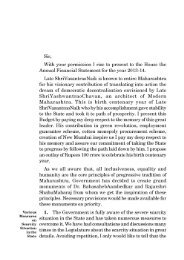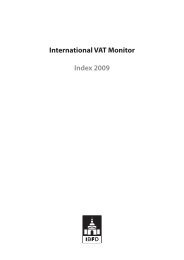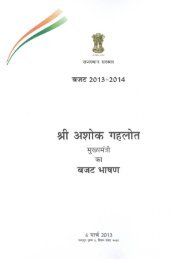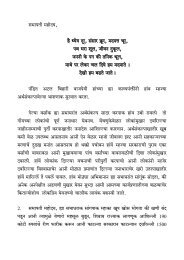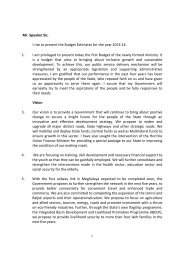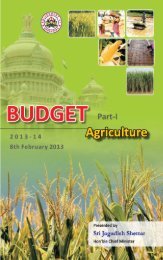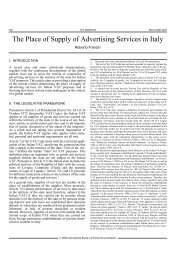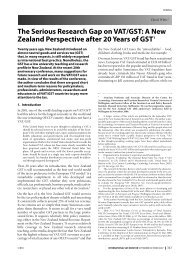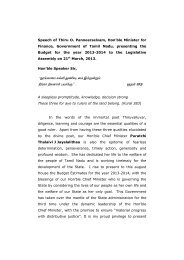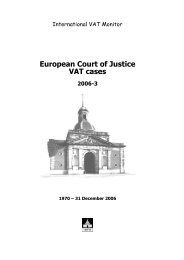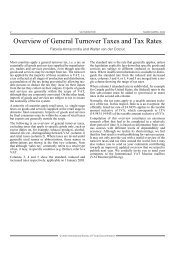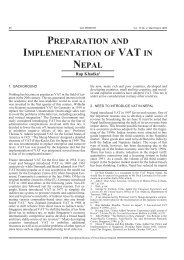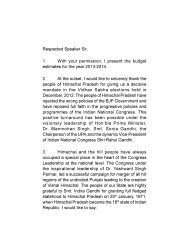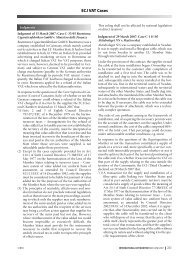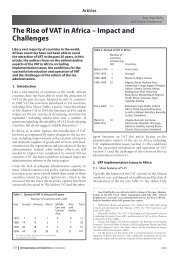VAT News - empcom.gov.in
VAT News - empcom.gov.in
VAT News - empcom.gov.in
Create successful ePaper yourself
Turn your PDF publications into a flip-book with our unique Google optimized e-Paper software.
Correct<strong>in</strong>g <strong>in</strong>voices<br />
Where <strong>VAT</strong> is not legally due and only payable to the<br />
authorities under Sec. 11(14) of the <strong>VAT</strong> Act, i.e. on the<br />
ground that the <strong>VAT</strong> was mentioned on an <strong>in</strong>voice, and<br />
the supplier subsequently corrects the <strong>in</strong>voice, the customer<br />
does not have to explicitly accept the <strong>in</strong>voice<br />
(unless he issues the correct<strong>in</strong>g <strong>in</strong>voice himself under<br />
the arrangements for self-<strong>in</strong>voic<strong>in</strong>g). Furthermore, the<br />
<strong>in</strong>itial <strong>in</strong>voices can only be corrected under those circumstances<br />
if the customer has not deducted the <strong>VAT</strong><br />
mentioned on the <strong>in</strong>voice or has actually repaid any<br />
deducted <strong>in</strong>put <strong>VAT</strong> to the tax authorities.<br />
Good faith<br />
The provision laid down by Sec. 12(1)(1) of the <strong>VAT</strong> Act<br />
that taxable persons are not entitled to deduct <strong>in</strong>put <strong>VAT</strong><br />
if they knew or should have known that the related supply<br />
was connected with <strong>VAT</strong> fraud has a clarify<strong>in</strong>g effect<br />
only. Those circumstances must be established under<br />
national law. In the case of carousel fraud, <strong>VAT</strong> shown on<br />
an <strong>in</strong>voice must be remitted to the authorities on the<br />
ground that the <strong>VAT</strong> has been mentioned on an <strong>in</strong>voice<br />
(see Art. 20 of the <strong>VAT</strong> Directive) and the recipient of<br />
the supply is not entitled to deduct that <strong>VAT</strong> as <strong>in</strong>put<br />
<strong>VAT</strong>, unless he was act<strong>in</strong>g <strong>in</strong> good faith. The recipient of<br />
the supply can be considered as hav<strong>in</strong>g acted <strong>in</strong> good<br />
faith, if he acted with due commercial diligence <strong>in</strong> order<br />
to ensure that he was not part of <strong>VAT</strong> fraud.<br />
Pharmaceuticals<br />
Under the amendment of the <strong>VAT</strong> Act that was published<br />
<strong>in</strong> Bundesgesetzblatt (Official Gazette) I 1 2/2008<br />
and entered <strong>in</strong>to force on 1 January 2009, the reduced<br />
<strong>VAT</strong> rate of 10% for pharmaceuticals exclusively applies<br />
to pharmaceuticals covered by the Arzneimittelgesetz<br />
(Act on pharmaceuticals), not to medical products<br />
fall<strong>in</strong>g under the Mediz<strong>in</strong>produktegesetz (Act on medical<br />
products). The latter products cont<strong>in</strong>ue to be subject to<br />
the standard rate of 20%.<br />
In its public notice of 17 December 2008, No.<br />
010219/0498-VI/4/2008, the M<strong>in</strong>istry of F<strong>in</strong>ance noted<br />
<strong>in</strong> this respect that Chapter 0 of the Comb<strong>in</strong>ed Nomenclature<br />
(“pharmaceutical products”) refers to both pharmaceuticals<br />
with<strong>in</strong> the mean<strong>in</strong>g of the Arzneimittelgesetz<br />
and medical products with<strong>in</strong> the mean<strong>in</strong>g of the Mediz<strong>in</strong>produktegesetz.<br />
Consequently, the importation of pharmaceutical<br />
products with<strong>in</strong> the mean<strong>in</strong>g of Chapter 0<br />
CN is not under all circumstances subject to the reduced<br />
rate of <strong>VAT</strong>.<br />
From our correspondent Hannes Gurtner<br />
Leitner+Leitner, L<strong>in</strong>z<br />
Belgium<br />
Hous<strong>in</strong>g as part of a social policy<br />
On 1 February 2009, the Royal Decree of 10 February<br />
2009, which amended Royal Decree No. 20 by <strong>in</strong>troduc<strong>in</strong>g<br />
several measures to stimulate the construction of<br />
houses as part of an economic stimulus package, was<br />
© IBFD INTERNATIONAL <strong>VAT</strong> MONITOR MARCH/APRIL 2009<br />
<strong>VAT</strong> <strong>News</strong><br />
published <strong>in</strong> the Official Gazette. The measures apply<br />
until the end of 2009.<br />
Under the amendments, the reduced rate of<br />
to:<br />
% applies<br />
– demolition and reconstruction of houses <strong>in</strong> the<br />
framework of the social policy;<br />
– construction and supplies of private dwell<strong>in</strong>gs<br />
<strong>in</strong>tended as the sole or ma<strong>in</strong> residence of the owner.<br />
In that case, the reduced rate applies to a ceil<strong>in</strong>g of<br />
EUR 0,000 and any surplus is subject to the stan-<br />
–<br />
dard rate;<br />
hous<strong>in</strong>g as part of a social policy, i.e. supplies of private<br />
dwell<strong>in</strong>gs, <strong>in</strong>tended for lett<strong>in</strong>g or sale <strong>in</strong> the<br />
framework of the social policy, made to prov<strong>in</strong>ces,<br />
<strong>in</strong>tercommunal companies, local authorities, <strong>in</strong>tercommunal<br />
public centres for social assistance and<br />
other social assistance centres.<br />
Work on immovable property used as shelter for psychiatric<br />
patients and the homeless is also subject to the<br />
reduced <strong>VAT</strong> rate.<br />
Monthly <strong>VAT</strong> refunds<br />
On 1 February 2009, the Royal Decree of 10 February<br />
2009, which amended Royal Decree No. 4 to the effect of<br />
extend<strong>in</strong>g the categories of taxable persons entitled to<br />
monthly refunds of excess <strong>in</strong>put <strong>VAT</strong>, was published <strong>in</strong><br />
the Official Gazette. Monthly refunds of excess <strong>in</strong>put tax<br />
are made to taxable persons who file their periodic <strong>VAT</strong><br />
returns on a monthly basis and structurally have excess<br />
<strong>in</strong>put tax due to the nature of their activities. The follow<strong>in</strong>g<br />
categories qualify for the refund:<br />
– taxable persons mak<strong>in</strong>g supplies of goods and services<br />
that are subject to the reverse charge mechanism,<br />
for example taxable persons operat<strong>in</strong>g <strong>in</strong> the<br />
construction sector or supply<strong>in</strong>g <strong>in</strong>vestment gold;<br />
– taxable persons carry<strong>in</strong>g out work on immovable<br />
property, supply<strong>in</strong>g build<strong>in</strong>gs, or assign<strong>in</strong>g or transferr<strong>in</strong>g<br />
rights <strong>in</strong> rem relat<strong>in</strong>g to build<strong>in</strong>gs, on the<br />
condition that those transactions are subject to <strong>VAT</strong><br />
at the rate of %;<br />
– <strong>in</strong> certa<strong>in</strong> cases, taxable persons supply<strong>in</strong>g goods<br />
and services that are deemed to be supplied abroad.<br />
Penalties relat<strong>in</strong>g to the reverse charge mechanism<br />
Under Art. 1(2) and (4) of the BTW Wetboek (<strong>VAT</strong><br />
Code), the reverse charge mechanism applies <strong>in</strong> an<br />
<strong>in</strong>creas<strong>in</strong>g number of cases. Under the reverse charge<br />
mechanism, suppliers of goods and services are not<br />
allowed to charge the <strong>VAT</strong> due on supplies to their customers<br />
but, <strong>in</strong>stead, the customers must account for <strong>VAT</strong><br />
through their periodic <strong>VAT</strong> returns on the value of the<br />
received supplies and, s<strong>in</strong>ce the reverse charge mechanism<br />
is limited to B2B situations, are entitled to deduct<br />
that <strong>VAT</strong> through the same returns.<br />
Violations of the reverse charge mechanism rules are<br />
subject to adm<strong>in</strong>istrative penalties which – depend<strong>in</strong>g<br />
on whether the penalty is imposed on the supplier or<br />
customer, the reverse charge mechanism was <strong>in</strong>correctly<br />
applied or <strong>in</strong>correctly not applied and the annual<br />
1



